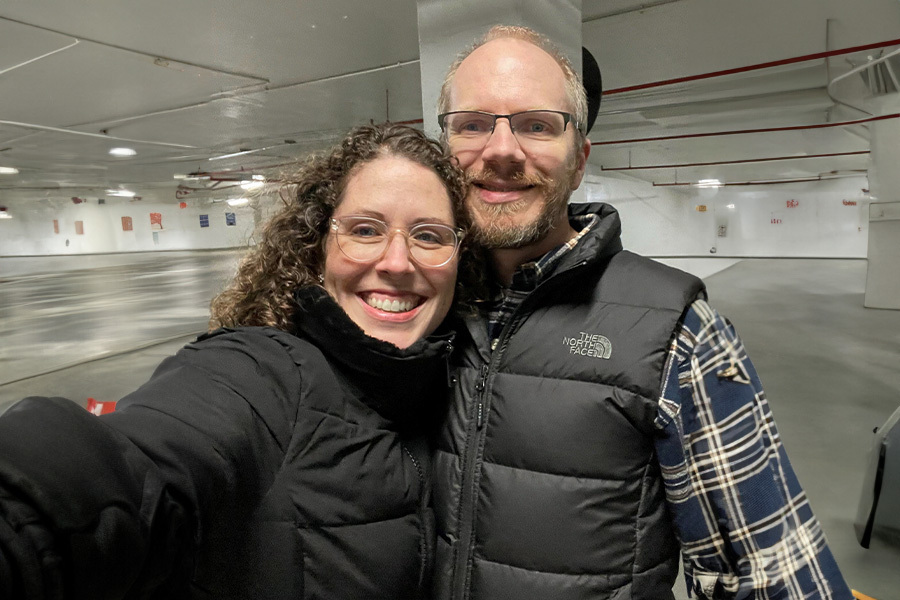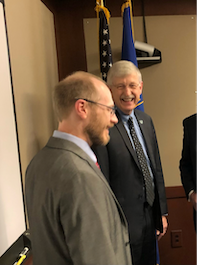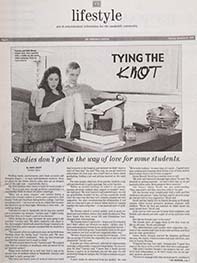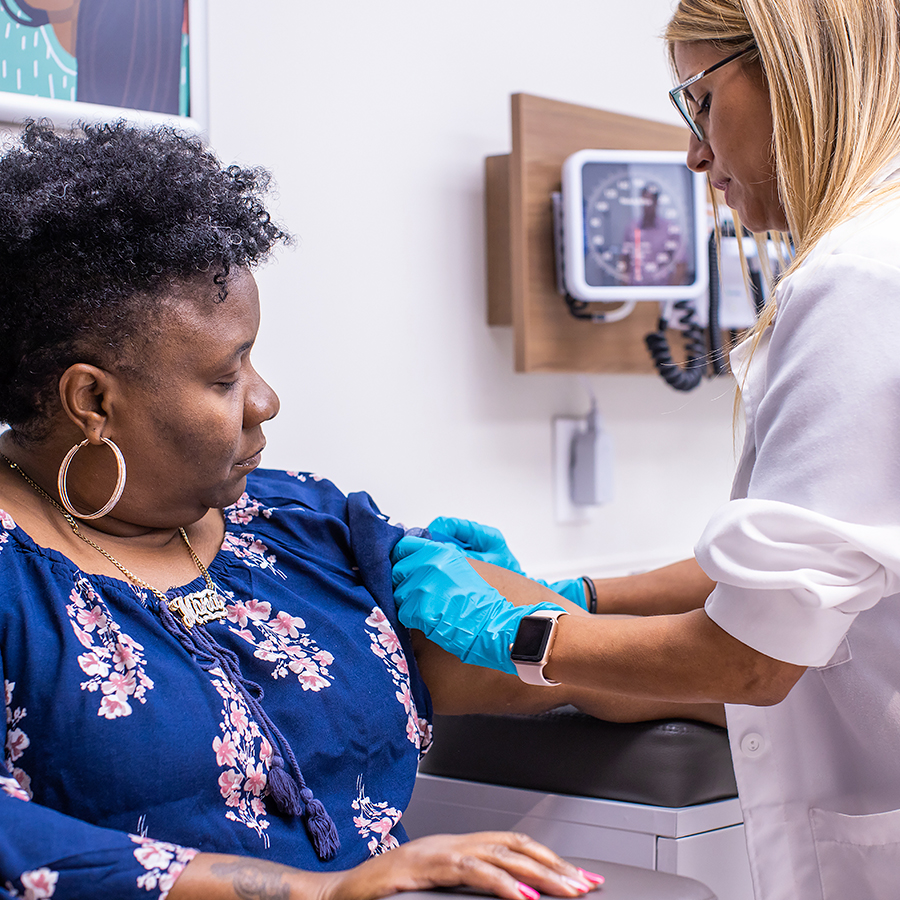
“What I saw as a doctor, as a dad, reinforced the relevance of large datasets—we can learn so much more when everyone participates. That’s why my wife and I are part of All of Us—so our kids and grandkids have a better future.”
Key Facts
- Josh’s family’s experience with rare diseases like cystic fibrosis contributed to his desire to pursue medicine.
- Josh and Carolyn’s son was diagnosed with a rare condition, neurofibromatosis type 1, which also motivated the couple to help advance precision medicine.
- Josh’s interest in computer systems and software led him to focus on biomedical informatics.
- Under his leadership, All of Us has made the world’s largest and most diverse resource database of its kind, allowing researchers to explore nearly any disease, including even rare diseases, and work toward solutions.
Precision medicine is personal for All of Us Chief Executive Officer Josh Denny, M.D., M.S., and his wife, Carolyn Denny, MBA. Navigating the impact of rare diseases on their family has strengthened the couple’s commitment to advancing precision medicine to benefit all.
“Our experiences have been motivating,” Josh said. “We know researchers can learn from large datasets to improve care for everyone.”
At a young age, growing up in Louisville, Kentucky, Josh was fully aware of the traumatic loss his father endured when four of his siblings died in childhood from cystic fibrosis, a progressive genetic disease that affects the lungs, the pancreas, and other organs.
“I’ve always been close to my grandmother, so I grew up hearing stories about the children she had lost,” Josh said. “My dad had memories of the last trip to the hospital with one of his siblings in his arms. You cannot quantify the pain that kind of loss causes. It leaves an indelible mark.
“That’s part of why I became a doctor,” Josh added. “I’ve always felt called to do something that helps people, especially where medicine doesn’t have any answers yet. We need more answers, treatments, cures.”
During his medical training at Vanderbilt University School of Medicine in Nashville, Tennessee, Josh saw a variety of patients with both common and rare diseases. He easily recalls patients he treated for whom the typical treatment didn’t work, whose diagnosis went undetected for years, or who had rare or unusually severe symptoms.
Josh applied that training to his own family after Carolyn gave birth to their second son in 2009. Within a few weeks after their son was born, both parents knew something was amiss. Their son landed in the hospital with a severe case of viral meningitis early on, and other health complications came in the years that followed. The Dennys quickly ruled out cystic fibrosis through testing, to their relief. But a diagnosis remained elusive. Finally, after years of consulting with specialists, their son was diagnosed at age 7 with neurofibromatosis type 1 (NF1), a rare condition that can cause tumors to grow around nerves in the skin, the brain, and other parts of the body.
For Carolyn, navigating the health care system for her son’s treatment gave her a sense of urgency. “Our son has had multiple health challenges with very few treatments. We’ve been eager for more information and progress,” she said. “We are seeing improvements—with more research, with more data. We would love to have more answers before our son grows up.”
Building a Framework for Precision Medicine
Josh was the first in his family to pursue a career in medicine, but that wasn’t the only path he’d considered. He had also maintained a hobby since middle school of building computer systems and writing software. In his third year of medical school, he took a break from medical training to explore ways of combining his passion for computer programming with science and medicine. That’s when Josh discovered biomedical informatics, the perfect match for his interests.
“Informatics was really energizing,” Josh said. “It was a way to use my passions to actually make a difference in medical education and later in medical discovery.”
In 2007, Josh took a faculty appointment at Vanderbilt and also was a practicing physician. He taught classes in biomedical informatics and medicine and pioneered the use of electronic health records (EHRs) in genomic studies. At the time, health records were organized to be used only for individual patients. There wasn’t an easy way to pull information from the EHRs across groups of patients to examine possible genetic connections. EHR data provided tremendous details for researchers, he said.
“I felt it was imperative that we be able to learn something from every patient we saw. It’s all taken for granted that we can do this now,” Josh said. “Back then, it was really a powerful new paradigm.”
At Vanderbilt, Josh helped launch the first pharmacogenetics program in 2010, using DNA samples to determine which medications were the right fit for individual patients. In 2015, he became the founding director of the Center for Precision Medicine.
The move to becoming CEO of All of Us in 2020 was a natural transition. Josh had worked with former NIH Director Francis Collins, M.D., Ph.D., who envisioned All of Us. The two had a strong bond as Dr. Collins discovered the genes for both cystic fibrosis and NF1, among other genetic conditions.
“Josh Denny is not only an internationally respected physician-scientist in the area of precision medicine; he is a dad who knows firsthand about the implications of genetic conditions for children and their families,” Dr. Collins said. “That just adds more fire to his passion for All of Us.”
Indeed, in addition to leading the program, Josh is pursuing his own research, tapping the program’s expanded dataset to advance research on both cystic fibrosis and NF1.

A Meeting of the Minds and Calling of the Heart

Throughout their careers, Carolyn and Josh Denny have encouraged one another. They met on a blind date 27 years ago while students at Vanderbilt and quickly discovered that they shared an independent streak, a passion for education, and a strong faith.
Carolyn was raised in a Philadelphia suburb, until her family moved to Nashville in middle school, where she would stay for almost 30 years. She pursued English and secondary education as an undergraduate at Vanderbilt and later returned for her master’s degree in business. For several years, she worked for a book publishing company as a brand manager.
Carolyn and Josh married on May 15, 1999, after her junior year and his first year of medical school at Vanderbilt—such a rare event on campus that the university newspaper wrote a feature story about it.
“It’s hard to believe that was almost 25 years ago,” Josh said. “Then again, we’ve come a long way since then! I guess you could say that for our family—four kids later—but you could also say that about medicine. A lot has changed for the better.”
All of Us is marking its own anniversary this May: five years since enrollment opened nationwide. Today, the program’s database includes more than 440,000 participants, who reflect the diversity of the country. The program has made nearly a quarter million whole genome sequences available for researchers, making the database the world’s largest and most diverse resource of its kind. Now researchers can explore nearly any disease, including even rare diseases, such as cystic fibrosis and neurofibromatosis, and work toward solutions.

“It was really important as we built All of Us that it be the kind of program that can cover all diseases, all lifestyles, all environments,” Josh said, “because every person matters, and it is literally more powerful when we all participate.”
Share your story with All of Us
If you would like to recommend someone to be featured, please submit a suggestion to All of Us.
Are you Interested in the All of Us Research Program?
- Learn about participation in the program.
- Learn about opportunities for researchers.


